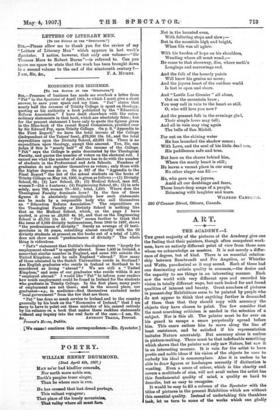ECONOMICS FOR IRISHMEN.
[To I= EDITOR OF TIM "S.CFLT01,21 Ihn,—Pressure of business has made me overlook a letter from "Pat" in the Spectator of April 13th, to which I must give a short answer, to save your, space and my time. " Pat" states that nearly half the revenue of Trinity College is spent on theology, quoting as his authority a book published by the "Education Reform Association." I have dealt elsewhere with the extra- ordinary statements in that book, which are absolutely false ; but for the present statement I have only to quote the figures given in the Blue-book of the recent Royal Commission, presided over by Sir Edward Fry, upon Trinity College. On p. 9, "Appendix to the First Report," we have the total income of the College (independent of the Tutors' fees), 476,360 18s. 5d., and the total expenditure upon the Divinity School, £2,991 10s. There is no expenditure upon theology, except this amount. You, Sir, can judge if this rs "nearly half" of the income of the College. "Pat" says the College is quite dominated by the Theological Faculty, and quotes the number of voters on the electoral roll. I cannot see what the number of electors has to do with the number of students in the Professional and Arts Schools. Numbers of graduates do not register themselves as voters ; only those with the higher degrees do so. On p. 887 of the "Appendix to the Final Report" the list of the actual students on the books of Trinity College on May 1st, 1906, is given as follows :—(I) Divinity School, 69; (2) Law School, 39; (3) Medical School, men 207, women 7-214 + 3 externs ; (4) Engineering School, 69 ; (5) in arts solely, men 189, women 70-859; total, 1,250. Where does the Theological Faculty dominate here ? In the face of these figures it is absolutely inexplicable how such statements can be made by a responsible body who call themselves an " Education Reform Association." The expenditure on the Theological Faculty or Divinity School is nothing like that on the Medical School, which, on the page I have quoted, is given as .28,805 4s. 2d., and that on the Engineering School is £1,751 13s. 5d. "Pat" seems further to think that the issue of 3,339 divinity testimoniume, from 1840 to 1897, shows "the predominance of divinity." Surely an average of 57 testi- moniums in 58 years, coinciding almost exactly with the 69 divinity students at present on the books out of a total of 1,250, does not show much "predominance of divinity." The whole thing is ridiculous.
"Pat's" statement that Dublin's theologians were "largely for employment abroad" is equally absurd. Some 1,400 in Ireland, a somewhat similar number in England, and some 250 outside the United Kingdom; and he calls England "abroad." How many Si those educated in the Scotch Universities reside in Scotland ? Are English graduates who reside in Ireland or Scotland to be considered as living " abroad" ? We are still a " United Kingdom," and none of our graduates who reside within it are "employed abroad." I would like " Pat" to inform your readers how much employment could be found in Ireland for the students who graduate in Trinity College. In the first place, many posts of employment are not there; and in the second place, our graduates—e.g., in medicine—find themselves excluded under "local government" from the few that are there.
"Pat" has done so much service to Ireland and to the country generally by his book on the "Economics of Ireland," that I am sorry to have to point out these mistakes of his, caused entirely by his reliance on a book that makes these reckless statements without any inquiry into the real facts of the case.—I am, Sir, Amour TIZAILL, Provost. Provost's Rouse, Dublin.
[We cannot continue this correspondence.—En. Spectator.]














































 Previous page
Previous page